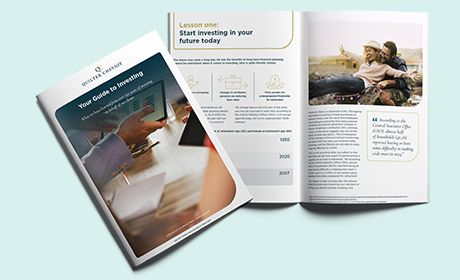There are several types of asset class. Here are some of the most commonly selected:
Alternative investments
An investment that is not one of the traditional asset types (equities, bonds and cash). They are typically investments in assets with a lower correlation to equity or bond markets, such as property, infrastructure, hedge funds, commodities and commodity funds.
Equities
Investment in equities, both UK and global, has long been the cornerstone of most investment portfolios, providing long-term scope for growth of both capital and dividend income. Also known as stocks and shares, equities give the person who holds the share (the shareholder) the right to take advantage of the residual assets of a company and have voting rights. Shareholders will usually receive a dividend. The amount they receive will depend on the profitability of the company. Equity performance can, however, be volatile in the short term.
Cash
Cash is often perceived as a risk-free investment, but it is also a low-return investment. Historically, cash has given a return of close to zero once the impact of inflation is taken into account.
Fixed interest securities (bonds)
There is a wide range of fixed interest securities, from low-risk short-term government bonds to high-risk long-term corporate bonds and high yield bonds. Bond investments pay investors interest at a fixed rate over the term of their investment. Bond investments can be a useful counterbalance for equities because the performance of these two asset classes tends to have a low correlation, meaning that they do not normally move in parallel.
Commercial property
Property is an asset class that has re-established its importance in the 21st-century. It offers the potential for long-term income and capital growth and is normally uncorrelated to equity markets. Investors would normally access this asset class through pooled collective investment vehicles, such as unit trusts and investment trusts.
Planning and investing for your lifetime
When thinking about your financial future, there are two key areas to consider. First ensuring you have a financial plan that looks to the future and any life events for which you might need to be prepared; and second, ensuring that part of this plan incorporates an investment portfolio that is positioned to meet your long-term needs.
Our financial planners work alongside our investment managers to deliver an end to end client experience that is designed to help you meet your long-term financial objectives.

Wrapping up your investments
As part of its drive to encourage saving and investing, the Irish Government has allowed certain investments to be exempted from the principal forms of Irish taxation. This protection is achieved by holding your investments within an appropriate ‘tax wrapper’.
You may already be familiar with tax wrappers such as Personal Retirement Savings Accounts (PRSAs), Approved Retirement Funds (ARFs) or investment bonds. Choosing the most efficient wrapper is vital, and often not easy to decide without professional advice e.g. choosing whether it should be in your name or your partner’s, or whether it needs to be jointly owned or placed in trust, as well as deciding which wrapper is most suitable.
For example, some wrappers:
- Refund tax that you have already paid on money when you invest (such as PRSAs).
- Enable you to not pay tax on the money you make (such as ARFs).
- Allow you to delay paying tax until a later date, when it may be more beneficial for you (such as on-and-offshore bonds).
The Government tends to review and adjust these wrappers every year, which means it is often impossible to say which ones are best without taking advice.
It is worth remembering that the choice of wrapper can also affect the level of tax you pay on the constituent investments held within them. So, making sure you have the right wrapper and in the right name and ownership structure is key.
Tax treatment varies according to individual circumstances and is subject to change.
Your Guide to Investing
If you want to learn more about investing, please read our full guide.
